In On the Conversation: Rachel Balkovec
Hey Everyone!
I recently had a chance to sit down and chat with my friend Rachel Balkovec. Rachel is an all-around badass. She was the first female strength and conditioning coach in Major League Baseball, holds two master’s degrees in the science of human movement, and is on a mission to empower young women.
She was recently hired as a full-time hitting coach for the Yankees, the first woman ever hired in that position. It’s a pretty big deal. So much so that the New York Times did a piece on her new role recently.
We talked about creating team culture, developing athletes to be able to coach themselves, using competition to drive cultural change and being the first female hitting coach in Major League Baseball, and more…
Enjoy the video of our conversation or read the full transcript below!
-Kelly
Kelly Starrett: Hey, welcome back. We are in conversation with one of my good friends. I consider, look, I’m an only child, but I seem to collect sisters and they all happen to be pretty extraordinary women, so I don’t know if which comes first, my need to have powerful strong sisters or they’re powerful, strong women, and I’m like, “you’re going to be my sister”. Rachel Balkovec so nice to see you again. Last time you were here at the house we were drinking wine. Neither of us really drink anymore. What happened?
Rachel Balkovec: I don’t know. Now we have different drugs so we’re both extremely caffeinated right now, which could be good or bad.
Kelly Starrett: A cup of fear.
Rachel Balkovec: Yeah, a cup of fear.
Kelly Starrett: Let me ask you this. So you’re in town, in town for Thanksgiving, orphans Thanksgiving and it’s so fun to have, one of the greatest joys of my life is that I have these extraordinary coaches come into my life and then I get to basically just pick your brain apart, what’s working, what’s not working. So, you are currently working at Driveline. Talk about what Driveline is and then we’ll get into a little of your history as we go so that we don’t just lead with the big bomb.
Rachel Balkovec: Okay.
Rachel Balkovec: Yeah. Keep, the big bomb, I’m working at Driveline Baseball finishing research for my degree, which is an MSC in human sciences-
Kelly Starrett: This is your second master’s degree? Correct?
Rachel Balkovec: Second master’s degree. It’s human sciences, biomechanics and statistics. Just basically math and then I’m doing research at Driveline Baseball, which is, phenomenal place. It’s like this magical utopia place where it’s probably the best integration I’ve ever seen between research and practical application and coaching, so we have full on two research grade, biomechanics labs, the third one that we travel with on the road, and then we’re full on training facility for baseball players and so it’s just like, this magical land I call it, the land of the misfit toys because all of us are kind of weird. We were all like very practical application, like we all played at least a sport, but most people played baseball, softball, and then also we’re super nerds, which is really hard to find. And so the founder of the company, it’s really driving from him, Kyle Boddy, the founder of the company, seeks people out that are like, that get it, that are athletes, that are competitors in some way or another, but then also are like research nerds that, want to dig to the bottom of things. So it’s really cool.
Kelly Starrett: There’s so many, so much to talk about. One of the things that I think is interesting that you’ve just alluded to is that there’s, it’s really difficult to be running an actual practice. And I mean running a like a sport practice, but working with athletes, managing all the aspects of team-dom right. And all of the complexity that we just gloss over how many different beds you sleep in as your professional team, how the interpersonal skills do you feel safe? I mean there’s just all of that, right? Food.
Rachel Balkovec: Yeah.
Kelly Starrett: Teenage millionaires. Then trying to make sense of what works, what doesn’t work and trying to wrap our heads around the science. And more importantly, what does the science say about improved function? I think it’s really a big deal that you guys are integrating. What do you think we’re getting right in those terms of, research and, actually researching real athletes? Not like we’re at college looking at 19 year old boys.
Rachel Balkovec: So that was a really long question. It’s coming straight from caffeine and I like that. And I’m going to put my cup of fear down so I can use my hand because I’m caffeinated. That was, it’s an interesting question. I think we’re in a weird time where it’s a really positive time because there’s so much tech coming out. We have, we can measure everything we want to and we can measure it three times a day. We can do it, we can, we have this capacity in some ways but of course, we’re not looking at the numbers as well as we could be. And I had a conversation recently with college coaches at a, college for a baseball team, and I said I think something that’s important that we need to address is we need to delineate between our processes that we are nailed down to and also a research and a separate research and development where everyone is basically in a, I think research and development mode, but you have to have these side projects that are research and development that you’re kind of like working on.
Rachel Balkovec: But for the athlete’s sake and for the coaches sake, you need to have processes that like you got your main dish and your side dish, and your main dishes need to be nailed down where you, you know or you think you know that, these three metrics are important. These are the ones we’re going to focus on. These are the ones that are bread and butter and also almost doubly as important is that the athletes understand those, your three main dishes. Because the problem we’re seeing now is like there’s so much data, which is hard for the coaches, but what we don’t think about is that it’s really hard for the athletes too, so they don’t know what’s important. They don’t know why they’re measuring all of this. They feel like guinea pigs instead of saying, “Okay guys, we’ve got three main dishes, these are the metrics we focus on.”
Rachel Balkovec: The players understand those metrics. They maybe even understand the technology. They use a technology in themselves. They can measure themselves. They’re dialed in on those three things and then we also have our research and development projects where those are the side dishes where you’re like, “Hey, player A, player B, okay, we’ve got our three main dishes. But also I’m curious about this and what do you think about this?” And this is our research and development projects that we’re okay not being very good at instead of right now everyone’s like, not everyone, many places are not very good at anything because they haven’t delineated between, these are the three like go, these are three metrics, these are what we’re doing. And then the side dishes of like, okay, we’re trying to stuff over here but we’re not going to let these fall and we’re also going to dial it in with the athletes so we’re not disrupting them every single day of their lives with random projects.
Kelly Starrett: We stole a picture, sort of, an illustration out of a book called 101 Things I Learned in Architecture and it’s about sort of, you start in and you’re like simplicity and you have like, Oh! Strength conditioning and nutrition sport and you’re like piece of cake and then you get in it for a little bit and all of a sudden you have a kludge. You have 17,000 things, 400 little boxes that you’re checking off and you can’t even tell what the through lines are. What’s important, how do we even, are we even getting better? I don’t know. But we have all this data. And eventually you’re trying to move to a place we call informed simplicity, which is, what are the building blocks and appreciating how these things interact. It’s very difficult because I have walked into plenty of high-performance environments where I’m like, okay, what’s important here?
Kelly Starrett: And if I ask everyone, they can’t tell me what’s important.
Rachel Balkovec: Yes.
Kelly Starrett: Right? We’re tracking, measuring, counting or we’re like, there’s so many boxes at the end of the day that athletes aren’t free to be athletes. I always think of something my uncle said, and he’s like in high school he was the head football coach of in high school and he said, “Hey look, if you want to win a high school football game, you give the ball to your best athlete.” And you, I’ve heard you say that, who you think the best athletes are on teams off often, but that simple Maxim is, an idea that I think for me represents this concept of what’s important here. Playing more, being bonded more, sleeping more and tracking those things and not having actionable takeaways that actually improve the system. Just makes more noise.
Rachel Balkovec: Yes.
Kelly Starrett: It’s difficult.
Rachel Balkovec: Yeah, that’s exactly. You just hit the nail on the head. I think with the whole, this baseball team that I went to go visit, I said, okay, I said, well, “What are your core concepts here of like what are the top three things?” And first of all, the coaches were like, “We don’t know.” So I was like, okay, so then definitely if you’re not sure, then if I asked any one of your athletes, what are the three things that you’re chasing as a hitter or a pitcher? Every department can have their own top three things or whatever, and then you might have a global, like top three things for your team, but if you ask those players and they have no idea, you’re in big trouble because then it’s like they come to the field every day, not really knowing what they’re being measured. What they’re being evaluated on, they know what they’re being measured, what’s being measured, but they don’t know what’s important.
Rachel Balkovec: So then they’re in this like kind of state of disarray where there’s just not, there needs to be probably more direction and again it’s not that you can’t measure 15 things so if you have the bandwidth and you have the staff and the tech.
Kelly Starrett: And it’s background, right?
Rachel Balkovec: Yes, like make that. The beauty about Driveline too is that they, have in Seattle we have a like research and development department and we’re working on a bunch of random stuff but then Driveline Baseball has their meat and potatoes like Driveline Baseball has the stuff that we’ve researched for a long time and then figured out what, we know or what we have come to conclusion we think we know. That’s Driveline Baseball and then we have a research and development department that’s like kind of background until we’re like, “Okay, we’ve done this long enough, we’ve researched enough. We have enough data to say, okay, now that’s going to be, that’s going to become part of our main dish.” And I think that’s like, the beautiful to come back all the way back to Driveline is I love it there because there’s order, and there’s also disorder, which is research and development. We measure a million things. We have a million projects going on, but the basis of Driveline Baseball doesn’t change because those are core concepts or core metrics or however you want to say it.
Kelly Starrett: One of the things that I am striving to work on myself that I’m interested in is moving the diagnostic closer to the actual task, right? And, narrowing that gap. Because what I see a lot of times is we have the thing that we care about, which is the only thing that we care about winning, like being healthy, that’s important, but it’s really about winning. So I really don’t care if you’re broken as long as we’re winning. Wink wink. But then simultaneously, we run sort of a parallel once every six months, once in a blue moon diagnostic process or I’m injured and then I go through this diagnostic process sort of post facto it’s too late. How do you think we can get better at more closely conjoining this diagnostic tool with understanding what’s happening in real time so that we have the feedback or latency? The mechanism there is more tightly coupled. Do you follow what I’m saying?
Rachel Balkovec: 100% and I think one of the answers is this is I think it’s a very deep issue like to do with our entire field of just we need to change the conversation at the university level, which I think we talked about briefly the other day is just like we are leaning on these movement screens once every three months instead of understanding that every single day is a movement screen.
Kelly Starrett: Do you think athletes change day to day?
Rachel Balkovec: Yeah.
Kelly Starrett: Tell me more.
Rachel Balkovec: I mean just-
Kelly Starrett: Because I mean they do.
Rachel Balkovec: Oh! They change well-
Kelly Starrett: I deadlifted heavy a few days ago. Like I get stiff the next two days. I’m like, “Wow! I don’t feel very athletic.”
Rachel Balkovec: Like you’re not going to do that again soon? Like, okay, there’s, changes from the morning to the night. So I think that’s one of the major problems with like, okay, every three months we’re going to do this movement screen or whatever. And, trust me, I understand the constraints of having a lot of athletes to work with. So you can’t do that every single day, so you can’t do it every single day. So let’s change the conversation to literally a guy walks in the weight room, the way that he’s standing that day should tell you something. So, that’s not, but that’s obviously a subjective, there’s different things you can do where if you have access to any kind of-
Kelly Starrett: Is this subjective, let me drill on that. Because my friends at Altis, they’ll watch their athletes walk around and athletes are fresh hop over the fence. Athletes who are not fresh walking around the fence. And every single day are like check. And then during warmup they’re like, I know everything I need to know about where this athlete is today and how hard we need to go. And so understanding what it is you’re seeing is crucial. That’s what I’m getting at.
Rachel Balkovec: It’s not subjective. Let me put it to you like this. I think people would say that is subjective, but is it? It’s just because they’re, we can’t put a number to, “Oh! he hopped over the fence, walked around the fence.” You can’t put a number to that so that it’s seen as subjective, but it’s not. It’s true information. It’s just real information. So it’s not subjective. However, you can’t, in a report, in my situation, say to the general manager, “Oh! Well that guy hopped over the fence today.” Good to go put them in the game. That doesn’t happen. You can’t do that. So well you can, but you can’t, in today’s world where a GMs function on numbers, so how do you do that? There’s different ways you can do it, where you have any kind of technology to be able to test a jump every day, whether that’s jump mat or that’s a GymAware or something.
Rachel Balkovec: Test a jump every day and that’s like your readiness test if you need to put a number to it. But of course going back to how do we need to fix that? It’s really like, at the university level or when we’re teaching young coaches. We needed to have some kind of way to teach them a coach’s eye where they’re looking for those things or they’re looking for what are their toes look like, what are their feet look like? They’re trying to assess just at a level where you can’t put a number to it and that’s okay. Whereas right now, the conversation that’s been building over the past 20 years frankly, is movement screen. All of these different screens that you can do. There’s so many now that you can only really do every three months because you only have the time to do it every three months or you’re on the road or whatever and that’s just not good enough. We need to be assessing every day.
Kelly Starrett: Let me ask you this and I, this is a set-up question because I know what kind of coach you are and what kind of athlete you are. Do you think it’s the coach’s responsibility for to be able to identify readiness, feeling? I mean or because we talk a lot about the relationship that we’re trying or the culture we’re trying to get the small society in your words, right? That the coaches, let me back up. In expert clinicianship, we agree that expert clinicianship is a conversation and a compromise between athlete and clinician. This is what I think is best. You think what this is best and what you guys should going to do and somewhere in the middle is the truth, right?
Rachel Balkovec: Yeah.
Kelly Starrett: I think do we have some, and this will be a perfect segue. Do we have some kind of weird patriarchical coach athlete relationship that we need to re-examine?
Rachel Balkovec: Well, yes Kelly, thanks for asking me that question. Such a good question. I never didn’t expect this one. We are making athletes incapable by needing to be the patriarch, needing to be the leader of the conversation. So we’re making them incapable. And I think it’s, a twofold situation where we actually see the athletes as incapable of doing these things themselves. And also we feel the need as coaches to have value. So we have to be the leader of them where I think that’s actually so ass backwards. And we have to start seeing these athletes as capable of way more from an intellectual and a cognitive standpoint of, “Hey, I’m going to teach you these things so that you don’t need me and I don’t need you to need me. I want you to do them on your own. I want you to be self sufficient. So I want you to be able to feel, I don’t want you to be able to need the GymAwear. I don’t need the GymAwear jumps or the jump mat jumps to tell you to tell you how you’re feeling.
Rachel Balkovec: You need to be able to wake up in the morning, go “not feeling it today” or “Oh! I feel great, I’m going to train harder today.” You need to be able to feel that and so we’re taking the ability away and obviously this has been discussed already, like kind of with unplugged and these conversations coming up where technology is ruining our sense of, like our internal feelings, but as coaches we can either proliferate that or we can, tamp that down and we can put more onus on the athlete and it’s not about saying, “Oh! You’re, weak. You need to take responsibility.” It’s about simply like providing, feelings and providing awareness to their mental state, to their physical state and we take that away from them.
Kelly Starrett: Do you think athletes are just an expression of the system? Their parents have recognized early on that if their mom’s carrying the bag and the dad is advocating for some or vice versa, dad’s carrying the bag, mom’s advocating for some hyper elite training program. Kid gets just handed on college, you’re just high school, you’re a piece of meat college you don’t feel, you just do, the reps do the thing. Do you think that by the time kids become professional athletes that they’re just, they’ve been taught helplessness? Is this learned helplessness or, disconnection from process and ownership?
Rachel Balkovec: We’re a product of our environment. I was just talking to Chris last night about this because-
Kelly Starrett: This is Chris Frankel of TRX.
Rachel Balkovec: Yeah, man, like I owe everything to all of my mentors and my parents from like day one, my parents were my original mentors, my original coaches before I had any coaches, you know. And so it’s, I feel fortunate, I don’t say lucky a lot, but I was born into my parents’ home and they’re fricking awesome. So I’m lucky to have my parents and I’m lucky to have crossed paths with Chris and then earned his respect enough to, for him to mentor me and then to lead up to all these other things in my career. I’m a product of my environment and we have to see our athletes as that because it’s so easy to say, “Oh! That guy’s lazy. He’s not intelligent.”
Rachel Balkovec: I hear this all the time. It like makes me cry. “Oh! He’s dumb.” What if you say that about an athlete? It’s just like, then you’re never going to teach him because you view him as being an unintelligent. So the second you’ve said that about somebody, you’ve created an environment for them. If you actually verbalize “he’s dumb”, oh, gosh! You just, you might as well just cut the guy because you’re not going to teach him everything that you know. So it is 100% like everything’s your fault, we have to create an environment that elicits behavior that we want. And if the behavior isn’t there, you have to look at the environment that you’re creating. The environment could be simply your words or it literally could be who are you pairing this, guy or girl with on the, squat rack. Are they functioning well as a pair? It could be the team setting, like what are, how are you positioning your team? So it’s, all about environment and, I started using the term constraints like culture. So you have to create the environmental constraints to elicit the behavior without even saying anything.
Kelly Starrett: That’s right. You don’t, this can’t be left to chance. We, create an opportunity like, “Oh! You jump and land with your feet turned out. Now you’re jumping around with your feet together. Welcome to feet together burpee”, where we’ve just constrain the idea. Just trying to make it as simple a concept-
Rachel Balkovec: because it is physical
Kelly Starrett: It is complex, you this a perfect segue. My understanding is you are one of the first women’s strength conditioning coaches in professional sports and you are the first woman in strength conditioning coach in professional baseball. Is that correct?
Rachel Balkovec: Yes.
Kelly Starrett: That was a few years ago.
Rachel Balkovec: Yeah.
Kelly Starrett: And I think you even have a championship ring from the Astros in your pocket.
Rachel Balkovec: It’s in a box buried somewhere in my parents’ house somewhere. But yeah. Metaphorically speaking.
Kelly Starrett: One of the things that you did was, because I sometimes get to work in, I come into environments, high performance environments and I sort of see what’s happening is really difficult to change, right?
Kelly Starrett: We have these pros and every once in a while I really try to support coaches so that they can, I’ve seen that the coach is for me is the most important part of any professional team. Right? That’s my bias. Players will come and go, the coaches, really change culture and empower these. But I’ve come to realize that at academy level, at the lower level, the minor leagues, that’s the place where we can make the most change in culture. Can you talk, I mean you told me a story last night about really redefining the relationship between coaches and athletes during a camp. Can you just talk about a little bit of that experiences for a second? Just kind of highlight?
Rachel Balkovec: Yeah.
Kelly Starrett: I think this is really the allegory for what we’re trying to get at. Right? There’s self-sufficiency, self- actualization.
Rachel Balkovec: Yeah. So this is like such a special topic because I just absolutely love, like I really literally love these kids. So the population I’ve worked with mostly I would say are a large part is the young Latin players in baseball. And to give anyone an idea who’s not a baseball fan, it’s like 16 year old kids who, some of them have a high school degree, some of them don’t. Most of them don’t speak English. So they’re coming with a lot of, sometimes coming with a lot of socio-economic issues…
Kelly Starrett: Like from the Dominican Republic?
Rachel Balkovec: Dominican, Venezuela. And so, and also like we’re talking about not just the regular old socio-economic like okay, single parent homes, those kinds of things. But also like literally a food shortage in Venezuela. Like we’re talking about real lack of these foundational things to feel safe. And so what I’ve just over a long period of time, when I first got in the game, just like anyone else, I was like, “What’s wrong with these kids? We got to push them and we got to…”, And it’s just taken me a long time to come to this –
Kelly Starrett: You didn’t care about that fifth squat on the third set. What’s wrong with you?
Rachel Balkovec: Yeah. Like I can’t believe it, but like they’re like, “Oh! I don’t get enough food when I’m at home.” Like there’s really like deep things that we need to provide for them. First and foremost of course is like those physiological needs literally of just eating food and stuff. So this is the bottom of Maslow’s hierarchy of needs pyramid. It literally is as a human being. So they come to the complex or they come to the academy and they have these square three square meals a day plus snacks. We kind of covered those things for them, but before we can get them to act like we want, which is be a team, right? Win a championship together, these high level things where you want-
Kelly Starrett: Like highest of the pyramid?
Rachel Balkovec: Literally and has in Maslow’s hierarchy of needs, the highest of the pyramid is, self-actualization and caring about other people.
Rachel Balkovec: We want them to do that where we just barely met the bottom of the pyramid needs. So we have to fill in those things for them and create an environment or a structure if you will, so they feel safe. And I don’t mean safe physically, I mean safe like from an emotional standpoint to be able to climb that ladder and get to self-actualization, caring about their teammates. And so I had the opportunity, the Astros were great to like at some point give me an opportunity to kind of run these camps alongside like a few of the coaches in the Dominican Republic. And one of the things that we focused on is creating the environment by creating like small societies that we talked about, and I could talk for hours on this, but we’ll stick to just this concept of creating small tribal communities within this camp.
Rachel Balkovec: And they just wildly surpassed our expectations of what they’re able to do simply because we put them in these small societies that made it easier for them to care about each other because they were in these small little tribal communities within this, camp that we ran and then they just took the roles and ran with it. I was telling you the other night about creating leadership roles for these young kids, which by the way, many people would say, “Oh! These, kids aren’t capable of these leadership roles or they’re not able to handle these things. They’re not, they don’t have that higher level of intelligence to be able to handle the leadership role.” And we created these small societies and assigned a tribal leader, if you will, of each of these small societies and they just like they became the president of the world.
Rachel Balkovec: They just took on this, amazing like alter ego. Once we gave them that role and just soared, they were just absolutely amazing to watch. Once we gave them the opportunity and empowered them. And you can empower people with knowledge of how to use technology or you can empower people with a role of leadership or role in, their, community where they feel safe. We said, “Hey, you’re the leader, go.” And they felt safe to say, “Okay, I’m the leader, I can lead this team, I can be vocal, I can push people on this team.” And they just, Oh! Man. To watch them succeed in that role was amazing.
Kelly Starrett: So to see athletes run and coach themselves, be autonomous really?
Rachel Balkovec: Yes.
Kelly Starrett: What was that? What did that free you up as a coach to do? Because I mean on like some of it is, we, hear very much babysitting, like if any coach ever shouts at me, the relationship is over. It’s really difficult to back out of that. How, did that change your actions? A coach because we have a lot of coaches who listen and it’s difficult to have quiet conversations and get everyone fired up and, herd cats and set… Like you really become a ninja master.
Rachel Balkovec: Oh! Yeah. Herding cats.
Kelly Starrett: But how did, that change what you were able to do?
Rachel Balkovec: Well, once you, it was a lot of work on the front end with the other coaches that were in the camp and myself to think really hard about creating the environment. But then once we like set it in motion, we were just like, okay, like chill. It was amazing how if we didn’t have to get upset with anyone because we created these small societies and if there was a lack of order, or somebody was showing up late, or there’s something happening, we didn’t even have to deal with it because we empowered those guys to make the decisions to deal with themselves. We gave them all the power. So then we just kind of sat back and we were like, okay, I guess these peer leaders became the coaches. And I think anyone out there has been a part of any kind of team where it’s an elite level team where they’re functioning at a high level, knows that if the coaches are having to do most of the work to keep everyone in line, it’s not an elite level team.
Kelly Starrett: No.
Rachel Balkovec: It comes from the peers. That’s always the stronger way to get something done. Especially when someone has to yell at someone because the coach, it’s just like mom and dad, you don’t want to hear from your mom and dad, but if your friend is like, “Hey, you’re messing up.” You’re like, “Oh! My mom and dad said that, but I didn’t listen, so I guess I got to listen to my friend”, you know that it’s the same concept. So it made it super easy on us. And I think I told you a story of like even to the point where sometimes I’d be like in the weight room with the group and the kid, the peer leader, the leadership role would go, “Rachel, can you leave the room? I need to talk to my team.” And I’m like. I was like, yeah, I’m like, I’m so proud.
Kelly Starrett: My work here is done.
Rachel Balkovec: I was like, “Oh! Yeah, okay, let me know when you’re done.” And just they really just took on that leadership role, which then made it so easy. It was just, it was fun. It was the most fun I’ve ever had.
Kelly Starrett: You mentioned, we’ve talked about the All Blacks book. What’s the name of that book?
Rachel Balkovec: Legacy.
Kelly Starrett: Legacy
Rachel Balkovec: Mm-hmm (affirmative).
Kelly Starrett: Vital reading. We also put on my radar, I can’t believe it. I had a huge hole in my understanding of how the world works. And you talk about the coach that we’ve been talking about a lot around this.
Rachel Balkovec: Anson Dorrance. Yeah, he, I mean-
Kelly Starrett: Say it again.
Rachel Balkovec: Anson Dorrance, UNC Women’s Soccer coach. Just, I stole everything. Well I stole everything from like my mentorship and the coaches that have coached me and my parents and those things-
Kelly Starrett: I’m not sure it’s stealing. I think it’s, we know like what are best practices, what makes Anson particularly interesting?
Rachel Balkovec: So, and I kind of told his story like little backstory. I was giving a presentation just recently, and I thought I was going to, I needed to find the best dynasty is what I was looking at. Because I like to study, cultures and teams and such that have been successful for a really long period of time through different changes in different people and whatever the leadership the structure stays the same. They continue to be successful. Like what do they do? So I was giving this presentation and I thought I’m going to look up the best dynasty. So I did a Google search, top 10 Google searches of the top 10 dynasties and then I looked at all of them and I made the spreadsheet and I was going to find the best dynasty. And what’s funny is I’ve of all the Google searches and the top 10 teams, this person was listed only one time.
Rachel Balkovec: And actually Anson Dorrance I think is probably has to be one of the best dynasties or examples of dynasties in sports of all time. He’s at 21 championships in 30 years. Never missed an NCAA tournament. Even the years that you didn’t win the championship-
Kelly Starrett: We’re talking about women’s soccer?
Rachel Balkovec: Women’s soccer. Furthermore, what’s even more impressive maybe is that we have all of these iconic figures in women’s soccer now and it’s a big deal and everyone wants to watch the world cup and, we’re celebrating this so much, it wouldn’t be here if it wasn’t for him. If you, look into the history of his coaching and just, his entire history as a person. He built, not single-handedly but, and he would never say I’m sure, but he was the guy who built US women’s soccer from zero. And people would say, “Oh! They didn’t want him to do it and there was no support.” And he built it.
Rachel Balkovec: I mean, we’re talking about iconic figures like Mia Hamm and Brandi Chastain ripping her shirt off and all these things. It’s Anson Dorrance. So not only has he created change in a small place where there’s, a small team of women every single year is successful, but also he like has created massive cultural change in the US but no one even knows about this guy. It’s amazing. So he talks about small societies and his book, which by the way, his book was recommended to me by Jeff Albert, Troy Snitker, those guys just like team of coaches that have mentored me in baseball. And he talks about small societies and also the competitive cauldron, assigning points to character and really eliciting behavior change through rewarding points to these small societies and getting them to care about each other and compete against each other in these small little tribes for the things that you want as a coach. So creating this environment, going all the way back, creating this environment –
Kelly Starrett: So if I, value a certain aspect and my athletes know they can compete for it, I may have that?
Rachel Balkovec: Yes.
Kelly Starrett: Strange. Amazing.
Rachel Balkovec: Shocking.
Kelly Starrett: So you’ve just changed roles. You realize that hey, I need to be more competent in sports metrics, right? You went and just got, we hung out this year in Germany. You were up in Amsterdam getting a master’s degree into of sport up there and now you’re at Driveline and you’ve just taken another role. We didn’t talk about that.
Rachel Balkovec: I was just given an opportunity by the New York Yankees to be a minor league hitting coach for 2020 season.
Kelly Starrett: Is that the first ever woman hitting coach ever in the history of baseball?
Kelly Starrett: That we know about?
Rachel Balkovec: Yes it is.
Kelly Starrett: Who hasn’t been quietly building a dynasty in North Carolina for a while?
Rachel Balkovec: Yes it is.
Kelly Starrett: One of the things that I think is powerful is that you come out of a movement tradition first. One is that you’re a high level athlete yourself. Two is that you, I watch your Olympic lift a lot. I, stalk you, train with you. You like to play volleyball, you stand up, you’re an athlete and then you are really competent strength conditioning coach. How do you think that impacts your ability to understand someone swinging a bat at a high level?
Rachel Balkovec: It’s the human body. It’s, there are obviously certain things that about the skill that are important to understand, which again-
Kelly Starrett: Have you ever swang a bat?
Rachel Balkovec: Only a couple of times. Yeah.
Kelly Starrett: You played in college, right, what did you play?
Rachel Balkovec: I was a catcher in college, so I have-
Kelly Starrett: But that, it was a wink because you’ve been throwing a ball and swinging a bat for a long time.
Rachel Balkovec: Yeah, I’ve got the shoulder to prove it. Yeah. So obviously, there’s those things as an athlete that I learned, but coaching is different. But also I’ve been so blessed to have amazing mentors with the Astros that while I was there as a strength coach, I was learning so much from the hitting department and the pitching department for that matter so much from those guys who are just like elite-level thinkers in the game. And so they were mentoring me and just, I was becoming more fascinating that wanting to expand the skillset, wanting to get into skill coaching. And at the end of the day, it’s like it’s the human body. And so what’s really unique about, I keep talking about these guys, the team, what’s really unique about those coaches, led by Jeff Albert, he has a kinesiology background himself. So Jeff Albert now is a major league hitting coach for the, excuse me, Cardinals was –
Kelly Starrett: And Jeff Albert has been on the old M|WOD, is the friend of the house.
Rachel Balkovec: Yeah. So he, has a kinesiology background himself and so of course the coaches that he hired with the Astros, he seeks out people that understand the body and not necessarily the elite baseball people, but understand the body and then can apply those concepts to the swing. So it just was natural that now Dillon Lawson is the guy who is largely responsible for hiring me with the Yankees. He was an Astros hitting coach. He has a degree in kinesiology as well.
Rachel Balkovec: And so he now is with the Yankees and he seeks out people that just understand the body and also the swing. But like I think it’s, I’m biased, but if you understand the swing but you don’t understand a hinge pattern or how feet interact with the ground or any of those things, you’re much more in the dark than if you understand the body. And you maybe don’t understand the swing as much. Someone like you were like you can break down a swing simply because you understand the body pretty well because it’s just, it’s the human body interacting with an environment in the same way that the human body interacts with any environment.
Kelly Starrett: And I’ll just say that some of these guys that are your friends and cohort send me pictures of or videos of elite hitters hitting and they were like what do you see? It’s like it’s a game I play where I try to, I’m like a blind man. I’m like “Well… I think there’s some internal rotation deficits and look at the shoulder here.” And they’re like “Wow! You saw all that?” And I was like well I don’t, you know the shoulder’s, the shoulder. Right?
Rachel Balkovec: Yeah. Exactly.
Kelly Starrett: Being able to rotate, is being able to rotate. How you pressurize before you swing is all the thing.
Rachel Balkovec: Yeah.
Kelly Starrett: Do you think, what are we just panning back for a second? Elite sport – what are we getting right? Because there’s sometimes the conversation is like where are the holes? How are we getting, because I think that’s part of our growth mindset, but what are we doing a good job of I and you can take that high or low.
Rachel Balkovec: Yeah. I really believe there’s a lot of positive movement in mental skills and the conversation is still relatively small but getting a lot bigger and people understanding the importance of mental health and like getting space for reflection and meditating and breathing and using these tactics.
Kelly Starrett: Wait. How many games a year in professional baseball?
Rachel Balkovec: Yeah, like a 180 well yeah, it depends a lot.
Kelly Starrett: A lot over 180?
Rachel Balkovec: Yeah, and then when you…people forget also instructionally and off season a winter ball and like some of these guys are playing, I mean an astronomical amount of games they-
Kelly Starrett: Hard to make behavior changes when they still need to go home and be with their girlfriends or wives still need to go have families like beyond, should we be measuring all the time tracking all the time?
Rachel Balkovec: Yeah.
Kelly Starrett: I mean at some point I’m like you need to go home and just be a human being, right?
Rachel Balkovec: Yeah they-
Kelly Starrett: Wash your car and do the dishes.
Rachel Balkovec: Have a different identity, don’t because these young guys, and I think again this is why, again this is just a bias opinion that I think mental skills has been getting bigger and I appreciate that a lot because, in my own personal career, my career as a softball player ended because of the yips and performance anxiety. And then I had this major identity-
Kelly Starrett: You call that yips?
Rachel Balkovec: Yeah. Do you know, are you like familiar with this?
Kelly Starrett: I am. But tell us what the yips are.
Rachel Balkovec: The yips are if you’re not familiar or like this happens in multiple sports but I think it’s most prevalent maybe baseball, softball where you like can’t throw the ball anymore. And so within probably about a week I had this like elite level, like laser arm and then I couldn’t throw the ball back to the pitcher within like a week. It’s just you just get like stuck and you can’t throw the ball. So I obviously or not obviously went through like depression, identity, crisis because I went from like, I wanted to play professional softball and I probably was physically would have been capable of that. But just all of a sudden I couldn’t, a skill that I was relying on for my identity was out of my head within a week.
Kelly Starrett: This, aspect we talk, we get a lot of athletes. I get a lot of older athletes who are wanting to win or play a few more years because they can. And then I also know a lot of athletes who finish their careers and they drop right in to major depression.
Rachel Balkovec: Oh! Yeah.
Kelly Starrett: Major self identity problems, alcohol, right? Drug. And that’s just trying to self medicate. Trying. And we’ve talked about even, Hey if I’m a high level athlete and even high school, I swim swim swim swim, then I just don’t swim. I’m not flooding my brain with all the chemicals that make me feel good. And all of a sudden there’s this vacuum and I think the-
Rachel Balkovec: Your support system I mean.
Kelly Starrett: We have girls who played at places like Stanford who come in and they’re like, “Oh! Yeah. I turned in my equipment and then I was cut off from the weight room and I never saw my team again.” And I was like-
Rachel Balkovec: What are we doing?
Kelly Starrett: And how that make you feel? She’s like, well like someone cut out my demon. Like I was just cut off from my family. So when you talk about the, this mental thing, do you think we’re doing a good job? Should we aspire to be athletes? BeCause it seems to me there’s a heavy cost potentially when I finished my career.
Rachel Balkovec: Okay so I said I am, I think what we’re getting right is the conversation is getting bigger but we’re not there yet. We have plenty of work to do in that area and there’s like certain things for example that I think, that we could attack from, again the identity standpoint, is we can’t have these guys relying only on one identity because we’re just setting them up to be depressed and like scared, as soon as they exit the game, which doesn’t do well for the game, it doesn’t. You hear all these guys who like leave the game and they hate it. I hate baseball. I there’s this like fear and anxiety surrounding it instead of appreciating it as a part of who they were, who they are, but also while they’re playing, how about we encourage them to do internships in the offseason? How do we help them find those? How about we foster better family environments and professional sports for God’s sake. We have so many, such high divorce rates and these things that, why are we even surprised?
Kelly Starrett: You’re just talking about the coaches right now.
Rachel Balkovec: Well, coaches and players, like gosh, like everyone is just we, and then we wonder why and then it’s again, going back to, we’re setting up this environment for people to fail. So how about we just like allow them to have better a sense of an identity outside of sports and, help them with that. Not just say, “Hey, have an identity outside of sports.” But actually again, create the environment for them. These young kids, they’re young, even when they’re 25 they’re young and by the way, they’re young and they’re, they’ve got a bunch of money in their pocket or whatever and they’re having to figure out they’re having to navigate this and they and everyone in their family, the first thing, any college athlete or professional athlete, first thing, any family member, “Hey, how was your game yesterday?” Like not, “How are you doing? How’s your wife? How’s your girlfriend?” You? They hand you that identity too.
Rachel Balkovec: So you’re constantly not only about any battling internally, this is the identity of given myself, but everyone is constantly handing you the identity. And so is Twitter and so is Instagram. And so there’s all these other distractions that are reinforcing this strong identity and then all of a sudden you get released and then you’ve got this like crazy identity that’s just not there anymore and you don’t even know who you are outside of it. So the conversation is starting. That’s what I think is positive. We obviously still have a lot more work to do to set up, not only to bring awareness to it’s important, but to create an environment that is like not just, Oh Hey, it’s important, but we’re going to help you actionably get to having better like self-awareness, having outside identities out of sport so you don’t crash and burn the second you’re done.
Kelly Starrett: This is why I pay Rachel to now stalk, my daughter on text, “Hey Georgia, what are you doing? You’re 14 you’re time to figure it out, Georgia.” No, it’s really difficult for me to appreciate that all I ever wanted was for my daughters to play high school sports. Right? That was the goal and yet sometimes I’m like, “Damn it, like Georgia hasn’t taken initiative yet and weren’t like why didn’t you lifting Olympic lifting on Sunday?” And I’m like, “Oh, She’s a 14 year old person struggling with like, do I feel safe at school and do I have a social.” It’s so hard not to apply the pressure by accident. And even in my own language sometimes people are like, “What do you do?” I’m like, “Well, I was trained as a physical therapist.” I don’t even just self-identify that anymore, identify myself as a coach.
Kelly Starrett: But I’m like, that’s it. But that identity piece is, I finished my paddling career on an injury and pretty sure I became hyper depressed and I remember going up to Seattle, but this is my uncle and waking up at three in the morning going to the gym because I was like, “Well…”
Rachel Balkovec: I’m fine, I’m fine, everything’s fine.
Kelly Starrett: Fortunately, I had my dog and coffee it’s all good. There’s my steel door and my heart and the problem is, we know that our athletes and warfighters any group, the people who are best able to dissociate sometimes are best at their job.
Rachel Balkovec: Yes.
Kelly Starrett: Like I can just shut off. But that ability to dissociate serves you for a while, but it does not for a minute.
Rachel Balkovec: Well.
Rachel Balkovec: There are two things to what you said is like you know, I think the one thing that we can do, well as coaches, be aware. I’ll give you an example. This is a very like microcosm example, but as coaches, rehab athletes. If you’re in a situation where you’ve got rehab athletes like, for example, at every spring training facility in major league baseball, there’s a group of athletes that are there training because they’ve had a surgery or something. So they’re like, they kind of, I think affectionately across the league we say they’re the team rehab and what I do is I never ever will ask them about their injury unless I have to for modifying something in the weight room.
Kelly Starrett: It becomes their identity.
Rachel Balkovec: Yes. Because they walk in and every day someone at least one person, so I’m just not going to contribute to that.
Rachel Balkovec: One person is like, “How’s your elbow feeling?” And then they have to, it’s like I am Tommy John surgery like this is, this is who I am and it becomes their identity. And then they’re like, it’s so many athletes go through depression during that. And then also when they come out of it because they no longer have that identity to like lean on, “Oh! I’m the hurt guy.” It’s like we stop as coaches., stop, please stop, like giving the identity to the person and start asking them questions about other things. Like “What are you reading?” and it shocks guys. I’m like, “What are you reading?” They’re like, “reading? Hmm. What’s that?”
Kelly Starrett: Is just a test.
Rachel Balkovec: Yeah.
Kelly Starrett: Am I failing?
Rachel Balkovec: Reading not sure.
Kelly Starrett: I can tell you what my HRV score is though.
Rachel Balkovec: Yeah, like gosh and then, yeah, exactly.
Rachel Balkovec: How do you feel that, wait, let me do my HRV. Okay, now I know how I feel. Yeah. But also speaking to the athletes, because I know there’s athletes that watch this and listen to this is try as hard as you can to get to a place, so like sometimes it’s physically and for me, I know we’ve talked about this is I purposefully try to travel to places where no one knows what baseball is because then you get rid of your identities that everyone’s handed you. And also you can’t rely on the identities that you’ve given yourself because no one cares about the Houston Astros.
Kelly Starrett: I love that. I love that you did some service work in a remote village and people didn’t know who you were. What you were there, are you a good person? Did you contribute to your tribe today? Like are you fun to play with? I mean it was like, and you were like, “Whoa! I’ve been reduced down to my base self”
Rachel Balkovec: And this is why, if, there’s a concept in a Man’s Search for Meaning. It’s one of my favorite books ever because he, Viktor Frankl talks about, he’s a doctor, a psychotherapist I believe, and he goes to the concentration camp and all of sudden he’s a doctor, he has a wife, he has a life, he has these identities. He talks about going to the concentration camp and very literally you are stripped of all your identities including whatever nice clothes you’re wearing because of your money that you have. Clothes are gone literally your hair, everything about you, every identity you’ve ever had is stripped from you and they got a number tattooed on their arm and they were, now that’s their identity. Everyone in the concentration camp no whether you’re a doctor or you are a janitor in the society you’re in, doesn’t matter.
Rachel Balkovec: They were stripped of all their identities and so he talks about, obviously it’s horrible time, but he talks about actually in some positive way of like he realized like how many identities he was hanging onto and now he’s just a member of this concentration camp and all you’re measured on is how much you’re helping the people around you, what kind of attitude you have when you’re in this horrible situation, how much meaning you can find in suffering. He talks about, and so I bring this all the way back too again, athletes like as much as you can try to stave off, if somebody tries to hand you those identities through Twitter or Instagram or your fans or whatever, stave that off and try to stay true to yourself and your thoughts that your identity really is just your own internal thoughts, which no one knows about yourself.
Rachel Balkovec: Sometimes you don’t even know. So get space away from those things so that you can reflect you. Not everyone has to go to a village in Laos. Even going to Amsterdam. I told the story before, but I was wearing a Houston Astros shirt in Amsterdam and literally someone’s like, “Oh! I like that shirt.” Is this is in the gym? I was like, “Oh! Thanks.” And they were like, “Is that a soccer team?” And I was like.
Kelly Starrett: Sort of.
Rachel Balkovec: I was like, “Oh! My God” Like go, it doesn’t have to be a remote village in Laos, but, go to places or just don’t wear your team gear out. Don’t, my Instagram profile does not have, you wouldn’t know that I was a hitting coach for the Yankees, because it’s not in there. Just like as much as you can. And, it’s impossible sometimes because I’m going to go at some point, wear a Yankees uniform. So it’s impossible. It just like I’m going to do, that’s my job. I go to work there. But as much as possible, try to be in environments where you don’t have to cling, to those identities or that you can’t even can’t cling to those identities because no one cares.
Kelly Starrett: I’m just going to say we started this interview because I, really we knew you got the job, became Amelia Earhart’s smashed a second ceiling. I mean it’s cool, it’s fine. Most people just smash one ceiling. But you two glass ceilings. But that’s the least interesting thing about you with, the thing that I’m we, this, if you think this conversation is for the camera, this is what we talk about. Like non-stop rolling. In fact, all the times we’re together as coaches, we’re obsessed about these things and I really do appreciate that, your growth mindset, how curious and stoked you are to feel, to be exposed, to be vulnerable. It’s, cool. And then, you’re like, “Oh! Also I do this.” And, it’s not who you are at all.
Rachel Balkovec: No.
Kelly Starrett: I think it’s really amazing and again it’s, absolutely worth mentioning how someone has to go first. Thank you. Gabby Reese, you got to go first. We need someone to go first, it’s not the most interesting thing about you. Not at all.
Rachel Balkovec: I don’t, I always tell people like, I don’t care about baseball. Really.
Kelly Starrett: Your power clean is your most interesting thing about you. That’s not true. Well, it’s mostly true. Okay. Last thing. You have this view, high school athlete, collegiate athletes, you’re around professional sports. Do you think, are sports still important today?
Rachel Balkovec: Oh! Yeah. I mean I so-
Kelly Starrett: Because it’s easier to watch sometimes the NFL or watch professional sports and hear about the governing bodies and how complicated it is as a business and yet it meets some need for us as human beings and I still believe in the power of sports and that all coaches are good people. Most, I mean, they want the best for their athletes. I really do believe that.
Rachel Balkovec: Yeah. I mean we, this is all wrapping into the conversation that we’ve had leading to this point is sports can be this amazing vehicle for whatever you want. This amazing vehicle for global changes, amazing vehicle for empowerment of these young individuals. This can be as amazing, just platform that’s different than any of the business because it’s on this yearly clock and you win or you lose. And where businesses can kind of exist and like, you’re not really sure how they’re doing. They can put it on social media, you’re not really sure how they’re doing, but sports, it’s public, it’s all public. You win or you lose every single year. There’s this year clock and all of these, young individuals are basically becoming warriors together and it’s fulfilling to your point, this like primal need that we have.
Rachel Balkovec: We talked about small societies earlier. That’s not a made-up thing. Anson Dorrance didn’t make that up. That’s a, thing in real life where-
Kelly Starrett: Socio-biology this is how our brains work.
Rachel Balkovec: We need, we should rely on each other. We should know our neighbors. We should really belong to this tight community and rely on each other, but we don’t anymore. And sports might be the last existing public, like really well known like social structure that actually provides us these tribal things. Not only the team and the athletes, but the communities that surround those teams. And so you go, we go to the game, you wear your costume, you put on your war paint, you do these chants at the football games. That’s primal. That a hundred percent is primal. Why do you think you’re able to just bond with these strangers, that are strangers, but they’re actually in your community?
Rachel Balkovec: That’s primal. Those are, we’re seeing our primal instincts in real life when those things happen and we don’t think of it like that anymore. But I do like that is so important. And you, and that’s why the sports are so powerful as they can bring people together, both from the fan perspective and then also the sports for the individual athletes and having that, small society of that team that’s working together to compete against another tribe, another city. And there’s a war going on. And that’s the haka you see with the All Blacks and those things. It’s like we’re fulfilling these primal needs that we don’t get any more because as a society, we’re so individual.
Kelly Starrett: Do you follow any specific sports?
Rachel Balkovec: No. I don’t care. I’ve never, I didn’t grow up a fan of anything and I think that’s a benefit.
Kelly Starrett: Me either. But if you put two people compete, I’m in. I’ll watch anything. I think I’m with you. I think that’s amazing. We can talk and talk but we’ll do part three of this thing. Next time, it’ll just be fizzy water, La Croix, our standard beer of choice. Where can we find you? You’re on the socials yeah?
Rachel Balkovec: I’m on the socials. I mean, it’s pretty easy to find me. Just, I mean, my website is rachelbalkovec.com, Instagram, Rachel Balkovec, Twitter you can I don’t know, you can just, I’m really easy to find.
Kelly Starrett: Is this the right place to talk about this project about young woman athlete girl empowerment or we’re going to talk about that the next time?
Rachel Balkovec: We can talk about it.
Kelly Starrett: Just like you realize like, you’ve kind of collected some really extraordinary women around you, before we go. Just that you have seen this be able to project sort of what needs to be done. Talk. We just, give me give us the last two minutes. So this is a whole other thing.
Rachel Balkovec: Oh my gosh, why did you do this
Kelly Starrett: I know. I can’t, but I think it’s so rad. What are you kind of working towards on this thing?
Rachel Balkovec: Oh my gosh, Kelly. Okay, I’ll try in two minutes. This is, I don’t know, that’s probably-
Kelly Starrett: This is actually elevator pitch.
Rachel Balkovec: Oh! Man.
Kelly Starrett: As your first as your first official sponsor?
Rachel Balkovec: Yeah.
Rachel Balkovec: So there’s a woman named Jen Widerstrom, I’ll just go down this path of we are both college athletes. She has gone on to be kind of fitness personality and television-
Kelly Starrett: She’s an All-American hammer thrower too.
Rachel Balkovec: Yeah. Like not just a college athlete but like elite level college athlete. Extremely, just, I’m so impressed by her and, we just connected like this past year at a conference SummerStrong by Sorinex and, we just hit it off. And both of us are kind of like seeing these same, the trend for young women that were not really on board with, because we’re seeing like, a bit of the Me Too movement, which is great. And I’m going to say this, because I know some people will get upset by this, but I want to share, Oh my gosh. Okay. Two minutes. This is what I want to share.
Rachel Balkovec: Jen and I have kind of come together. We’re going to start creating events on these things because we think it’s an important conversation to have where we need to focus more on the empowerment of women and also celebrating what’s going on instead of what’s happened with the Me Too movement is it’s great. Okay. Me Too, we’ve gone through the struggle we’re acknowledging that there’s been a struggle we’re acknowledging that there’s been some oppression, there’s been abuse these things. But I asked your daughter the other day, I don’t even know if you were in the room. I asked Georgia 14 years old, “Do you know about the Me Too movement?” She said yes. And I said, “How does that make you feel?” And she said, “It makes me feel really sad.” And that right there is the summary. Hashtag Me Too and this, idea of like, all right, we’re acknowledging that there’s been some oppression that the Women’s Marches et cetera.
Rachel Balkovec: There’s some good things going on, but I want to change it from hashtag Me Too to hashtag We Can that there’s a community component of it of like this empowerment and we leaning on each other and supporting each other as women and not continuing to call attention to the oppression and the victimization of women, but simply saying, “We have all these opportunities. What are we doing with them?” We can like the first, movement of any like change is that you have to do it yourself. You have to like earn it and yes. Okay. It sucks. Is it fair? No. Does it matter? No. So we’ve been through this oppression, there’s been discrimination. I faced blatant discrimination getting into male professionals sport. Blatant. This was five, six years ago. We’re not talking about 40 years ago, so trust me, I know. Hashtag Me Too.
Rachel Balkovec: I know. Trust me, but I choose not to focus on that. What I’m choosing to focus on is the men that have supported me and hired me and also the amazing women. When we talk about Juliet, we’re talking about Georgia, we talk about Gabby, like these, amazing women that have supported me and helped me and that I lean on. So we’re empowering each other and, we’re loving men and being thankful for the men because all men have hired me by the way, so I don’t hate men. I’m so grateful for them. So what Jen and I want to do and just what I, I guess this was like already five minutes. The last two minutes is just to say like, okay, all right, great. We’ve acknowledged that we’re, that we’ve been discriminated against and oppressed and abused and these things. Okay, we’ve acknowledged that, but let’s stop being sad and let’s start calling attention to our capability instead of our victimization.
Kelly Starrett: So you’re saying Baseball isn’t your only identity.
Rachel Balkovec: Oh! Man.
Kelly Starrett: The one and only incomparable Rachel, thank you so much. It’s such a pleasure. Orphans Thanksgiving.
Rachel Balkovec: Thank you Kelly. Yep. Next year.
Kelly Starrett: See you guys next time.

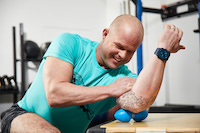
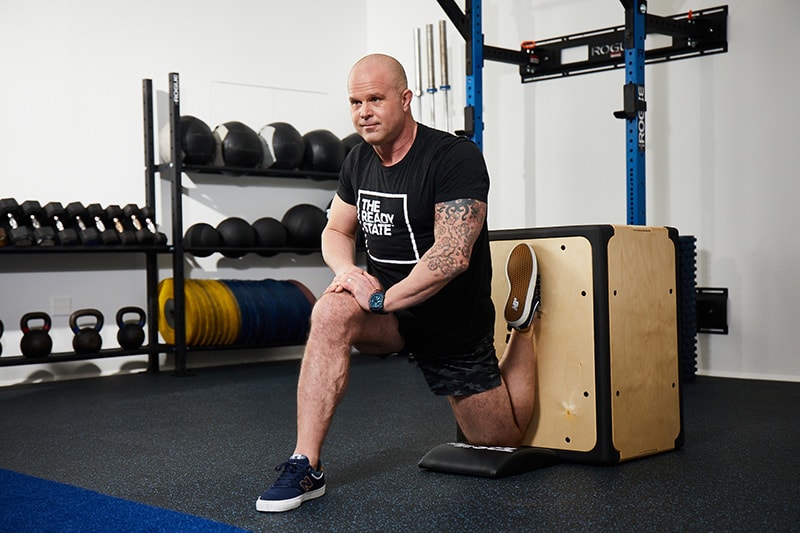
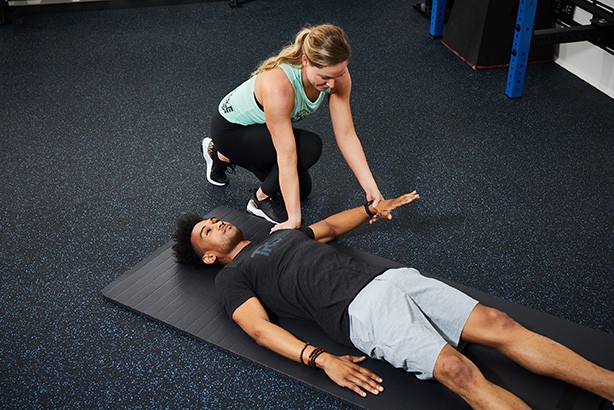
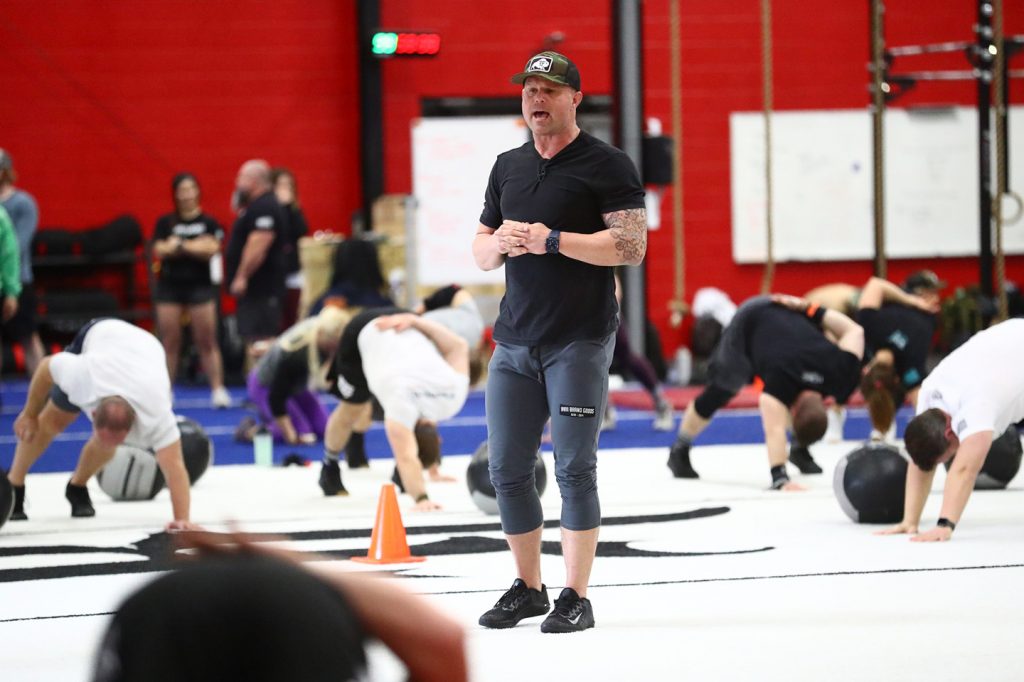
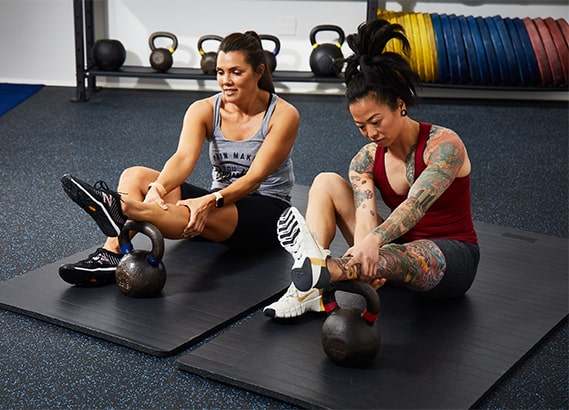
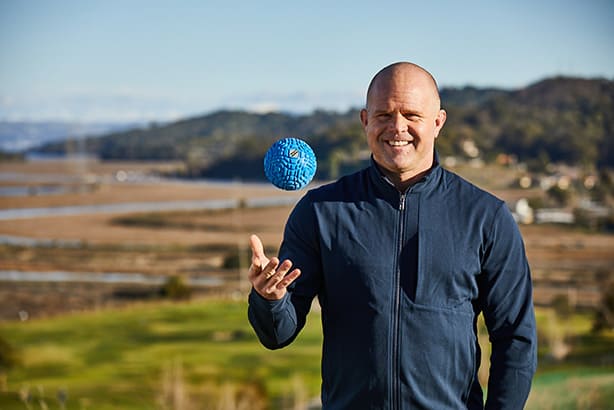

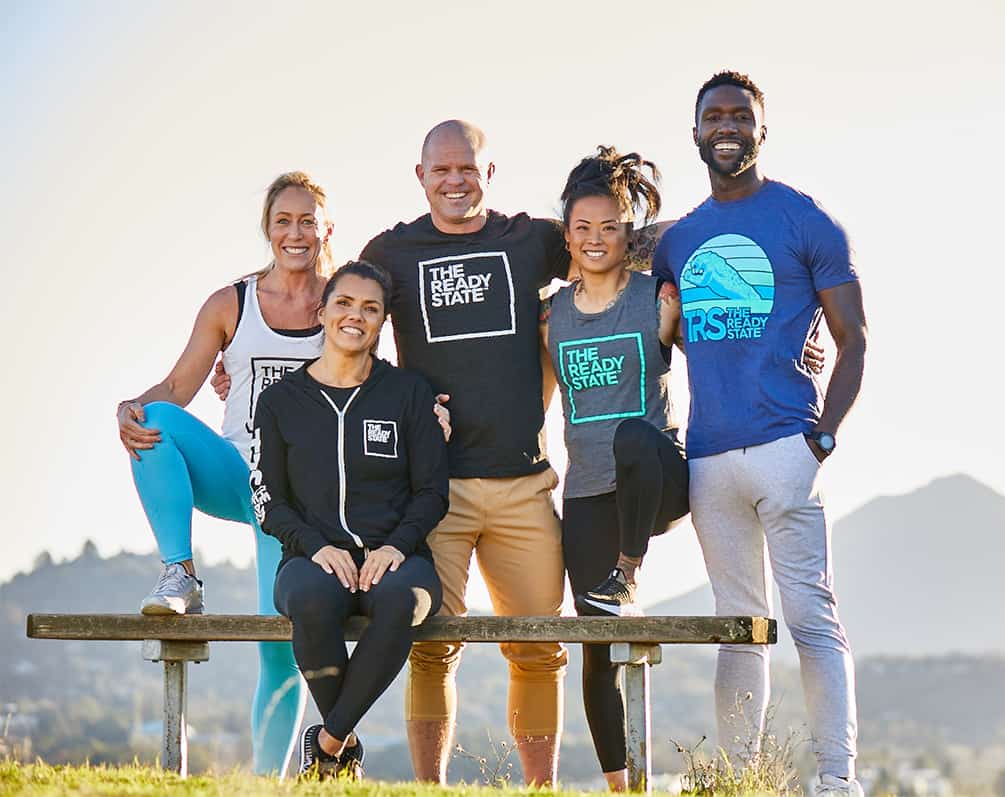

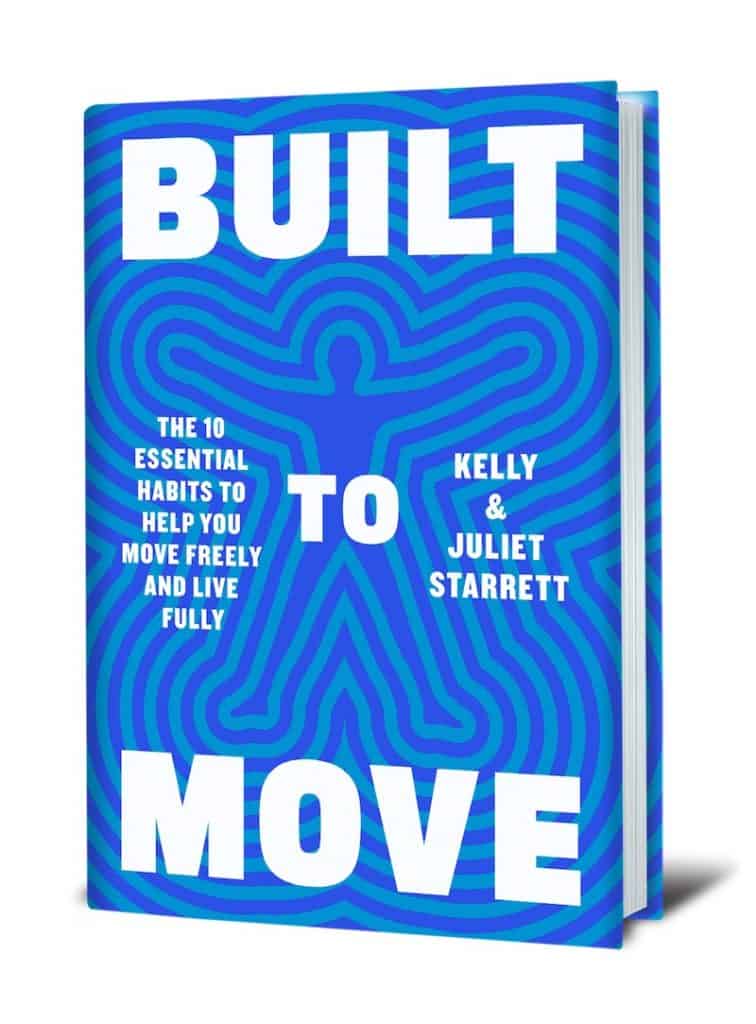
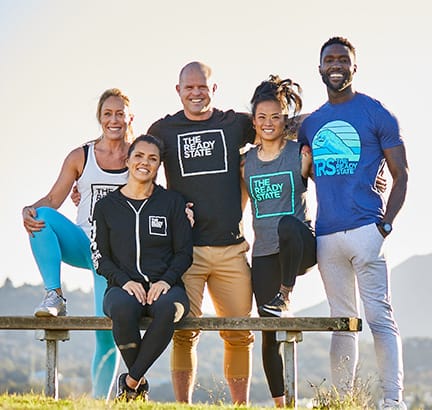
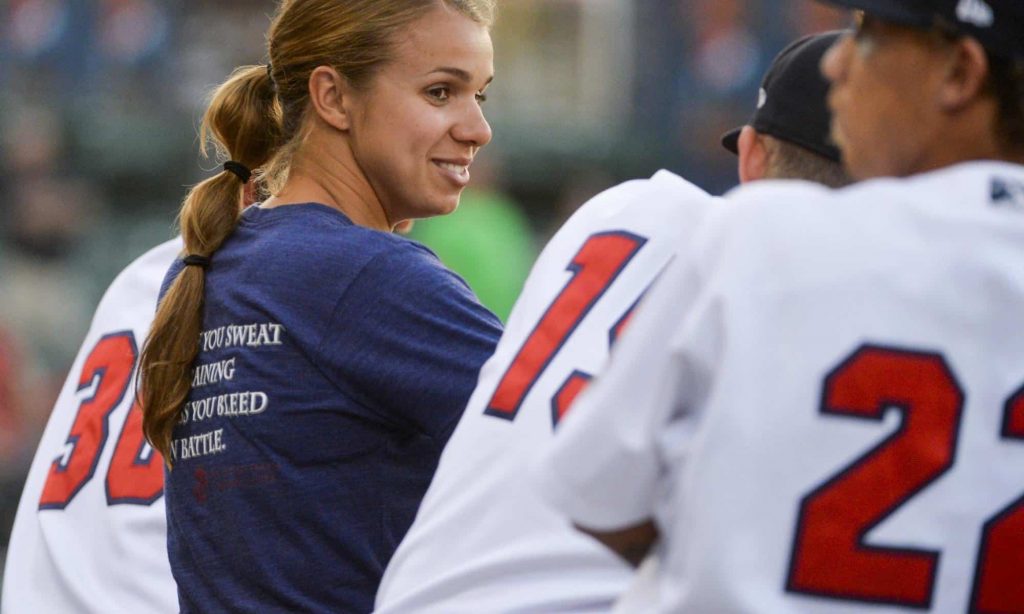






TRS Virtual Mobility Coach
Guided mobilization videos customized for your body and lifestyle.
FREE 7-Day Trial